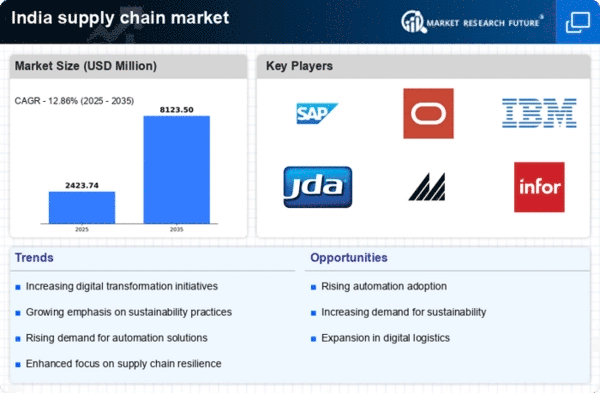E-commerce Growth and Demand
The surge in e-commerce activities in India is significantly impacting the supply chain-management market. With online retail sales expected to reach $200 billion by 2026, the demand for efficient supply chain solutions is escalating. Companies are compelled to enhance their logistics capabilities to meet consumer expectations for faster delivery and better service. This trend is driving investments in warehousing and distribution networks, which are essential for supporting the growing e-commerce sector. As a result, the supply chain-management market is likely to witness a substantial increase in demand for innovative solutions that cater to the unique challenges posed by e-commerce.
Rising Consumer Expectations
As consumer preferences evolve, the supply chain-management market is adapting to meet rising expectations for transparency and speed. Customers now demand real-time updates on their orders and faster delivery times, which necessitates a more agile supply chain. Companies are increasingly investing in technologies that provide visibility and enhance customer engagement. This shift is likely to drive the market towards more responsive and customer-centric supply chain solutions. The ability to meet these expectations could potentially differentiate successful companies in a competitive landscape, making it a critical driver for the supply chain-management market.
Sustainability and Green Logistics
Sustainability is becoming a pivotal concern within the supply chain-management market in India. Companies are increasingly adopting green logistics practices to minimize their environmental impact. This includes optimizing transportation routes to reduce carbon emissions and implementing sustainable packaging solutions. The market is witnessing a shift towards eco-friendly practices, with a projected increase in demand for sustainable supply chain solutions by 30% over the next five years. As consumers become more environmentally conscious, businesses that prioritize sustainability are likely to gain a competitive edge, further driving the evolution of the supply chain-management market.
Technological Advancements in Logistics
The supply chain-management market in India is experiencing a notable transformation due to rapid technological advancements. Innovations such as artificial intelligence (AI), machine learning, and the Internet of Things (IoT) are enhancing operational efficiency and decision-making processes. For instance, AI-driven analytics can optimize inventory management, reducing costs by up to 20%. Furthermore, IoT devices facilitate real-time tracking of goods, which is crucial for maintaining supply chain integrity. As companies increasingly adopt these technologies, the market is projected to grow at a CAGR of 15% over the next five years, indicating a robust shift towards tech-driven logistics solutions.
Government Initiatives and Policy Support
Government initiatives aimed at improving infrastructure and logistics are playing a crucial role in shaping the supply chain-management market in India. Programs such as the National Logistics Policy and the Gati Shakti initiative are designed to streamline processes and enhance connectivity across the country. These initiatives are expected to reduce logistics costs from 13% to 8% of GDP by 2025, thereby fostering a more competitive environment for businesses. The support from the government not only encourages private sector investment but also enhances the overall efficiency of supply chains, making it a vital driver for market growth.
















